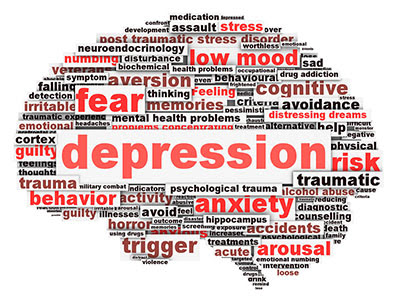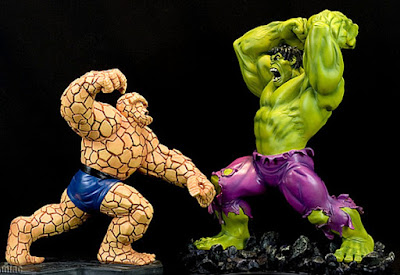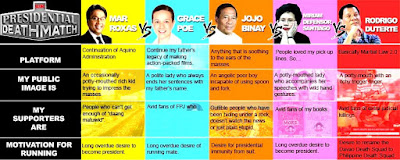ANXIETY DISORDERS: IS YOUR NERBYOS KILLING YOU?
by Randy Dellosa, psychiatrist-clinical psychologist-life coach
by Randy Dellosa, psychiatrist-clinical psychologist-life coach
“Nerbyos” is a tagalog word which apparently comes from the English word “nervous.” When pinoys say that a person has “nerbyos,” it usually means that that person is suffering from a mental or emotional condition. For psychologists and psychiatrists however, the term “nerbyos” specifically refers to the psychiatric condition known as anxiety disorder.
Pinoys believe that “nerbyos” is caused by a “bara sa ugat (i.e., blockage in the nerves or nerve conduction).” To some degree, that belief is true because research has found out that there is a disturbance in the flow of brain chemicals (e.g., adrenaline, dopamine, serotonin, etc.) through the nerve cells.
Pinoys believe that “nerbyos” is caused by a “bara sa ugat (i.e., blockage in the nerves or nerve conduction).” To some degree, that belief is true because research has found out that there is a disturbance in the flow of brain chemicals (e.g., adrenaline, dopamine, serotonin, etc.) through the nerve cells.
NORMAL VERSUS ABNORMAL ANXIETY
Anxiety is a normal experience in life. Anxiety tells us that we have to prepare for an impending problem, stressful situation, or crisis.
Anxiety however becomes abnormal when it is:
* too intense
* too prolonged
* recurrent
* experienced for no apparent reason
* triggered by minimal or insignificant stimulus
* a disturbance to our daily life.
CAUSES OF ANXIETY DISORDER
Caffeine, uppers (like shabu, cocaine, heroin, ecstacy, etc.), bad trips from marijuana, hormonal imbalances, certain medications, and some medical illnesses may cause anxiety.
Emotional baggage and stress are psychological reasons to feel anxious.
Research also indicates that anxiety disorders may be transmitted through the genes.
WHAT DOES AN ANXIETY ATTACK FEEL LIKE?
Imagine downing 3-4 cups of brewed coffee all at one take. How would you feel?
Imagine standing at the ledge of a 50-foor building. How would you feel?
* restlessness or uneasiness (pagkabalisa, di mapakali)
* palpitations or pounding heartbeat (kabog ng dibdib)
* hyperventilation or shortness of breath (kapos sa paghinga)
* fainting, dizziness, light-headedness (parang mahihimatay, pagkahilo, pagkalutang)
* cold spells (panlalamig ng katawan)
*digestive problems (acid reflux, GERD, LBM)
* tremors and numbness (pangiginig, pagmamanhid)
* body weakening (parang nauupos na kandila)
* feelings of going crazy, of having a serious illness, of dying, or of losing self-control
Can you imagine the agony of having to intensely experience all these symptoms all at one time, or all the time?
WHICH TYPE OF ANXIETY DISORDER DO YOU HAVE?
Anxiety disorders come in different forms:
1. Panic Disorder: Intense anxiety attacks that recur frequently.
2. Generalized Anxiety Disorder (GAD): Anxiety and worrying throughout the day, every day.
3. Simple Phobia: Intense anxiety when expose to feared objects or situations.
4. Social Phobia: Intense anxiety when around people or when interacting with people.
5. Agoraphobia: Intense anxiety in situations wherein the person feels trapped or unable to get help.
6. Separation Anxiety Disorder: Intense anxiety when separated from a person who is a source of safety and security.
7. Selective mutism: Failure to talk in selected anxiety-provoking situations.
SO HOW ARE ANXIETY DISORDERS TREATED?
Anxiety disorders are best treated by medication, talk therapy, wellness therapies, and stress management techniques.
Regarding medications, I avoid giving tranquilizers like Valium, Rivotril, or Xanor because they are habit-forming and may cause depression. The better option is taking an anti-depressant because they are relatively safe and non-habit forming.The important thing though is for the patient to find the “right” medication, one that is “hiyang” to him or her. The right medication is one that
(1) has no side effects and
(2) which significantly reduces or obliterates the anxiety symptoms within 2-3 weeks.
If the medication produces side effects, it obviously has to be changed.
HELP AND HOPE FOR THOSE SUFFERING FROM ANXIETY ATTACKS
From my clinical experience, 99% of all my patients experience significant improvement or total recovery within 2-3 weeks of finding the right medication. Hope is real if you just reach out for professional help! And the faster you get help, the more quickly you’ll recover!
Visit randydellosa.com or randydellosa.net for the compassionate and competent help you need!
























































